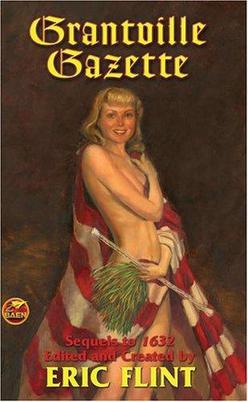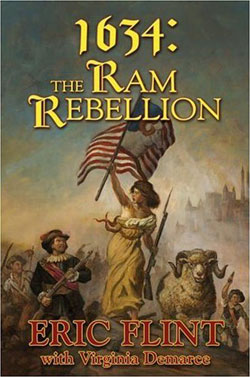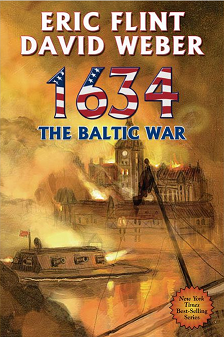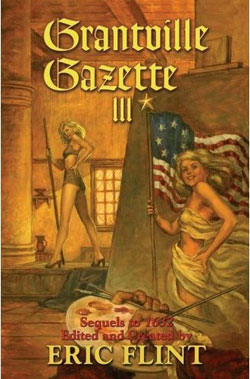
Eric Flint was an American author, editor, and e-publisher. The majority of his main works are alternate history science fiction, but he also wrote humorous fantasy adventures. His works have been listed on The New York Times, The Wall Street Journal, The Washington Post, and Locus magazine best seller lists. He was a co-founder and editor of the Baen Free Library.

1632 is the initial novel in the best-selling alternate history book series, "1632", written by American historian, writer, and editor Eric Flint and published in February 2000.

The Grantville Gazette is the first of a series of professionally selected and edited paid fan fiction anthologies set within the 1632 series inspired by Eric Flint's novel 1632. The electronically published the Grantville Gazettes, which are reaching long novel length with regularity, now make up the majority of the series in terms of words in print. Flint as series owner and editor accounts all as canonical. The Science Fiction Writers of America (SFWA) recognizes published stories within the Gazettes as qualified credentials for membership—which membership requires a writer to have three published works as prerequisites.

The 1632 series, also known as the 1632-verse or Ring of Fire series, is an alternate history book series and sub-series created, primarily co-written, and coordinated by American author Eric Flint and published by Baen Books.

Ring of Fire is the third published book by editor-author-historian Eric Flint of the 1632 series, an alternate history series begun in the novel 1632. The Ring of Fire is both descriptive of the cosmic event as experienced by the series' characters, but also is at times used as the name for the series itself. The series is set in war-torn Europe during the middle of the Thirty Years' War.

1634: The Ram Rebellion is the seventh published work in the 1632 alternate history book series, and is the third work to establish what is best considered as a "main plot line or thread" of historical speculative focus that are loosely organized and classified geographically. The initial main thread is called the "Western and North-Central Europe thread" ; the second plot line, encompassing events in Italy, Spain, the Mediterranean region, and France, the "South European thread", and this book can be considered the starting novel of the "South-Central/South-East thread" being set in southern Germany, Austria, Bavaria, and Bohemia. This geographically organized plot thread actually began in Ring of Fire in Flint's novelette "The Wallenstein Gambit" which is set in Bohemia, Austria, and Germany, which tied into stories in various Grantville Gazettes.
The Grantville Gazettes were a series of anthologies of short stories set in the 1632 universe introduced in Eric Flint's novel 1632 that was published as a bi-monthly electronic magazine from 2003 until shortly after Flint's death in 2022.

Grantville Gazette II is the third collaborative anthology published in print set in the 1632-verse shared universe in what is best regarded as a canonical sub-series of the popular alternate history that began with the February 2000 publication of the hardcover novel 1632 by author-historian Eric Flint. Baen Books and Flint decline the distinction, counting this book as the sixth published work. Overall it is also the third anthology in printed publication in the atypical series, which consists of a mish-mash of main novels and anthologies produced under popular demand after publication of the initial novel, which was written as a stand-alone work.

1634: The Galileo Affair is the fourth book and third novel published in the 1632 series. It is co-written by American authors Eric Flint and Andrew Dennis and was published in 2004. It follows the activities of an embassy party sent from the United States of Europe (Grantville) to Venice, Italy, where the three young Stone brothers become involved with the local Committees of Correspondence and the Inquisition's trial of Galileo Galilei.

1635: The Cannon Law is the sixth book and fifth novel published in the 1632 series by Eric Flint and Andrew Dennis. It is the second novel in the French-Italian plot thread, which began with 1634: The Galileo Affair and was published by Baen Books in 2006. The book explores the reactions of the Roman Catholic hardliners to Pope Urban VIII's actions in tolerating the new freedom of religion taking root in Central Europe during the climax of The Galileo Affair.

1634: The Baltic War is a sequel to both the first-of-type sequels, Ring of Fire and 1633, co-written by American authors Eric Flint and David Weber published in 2007. It had to await schedule co-ordination by the two authors, which proved difficult and delayed the work by nearly two years. It continues theMain or Central European threadcentered on the newly organized United States of Europe birthed in Central Germany under the protection-by-arms of Emperor Gustavus Adolphus and in particular, the role of the citizens of Grantville, now of Thuringia, and the capital city of Magdeburg have to play on the world stage. With the stability imposed by the protection of Gustavus's armies, up-timers began migrating to other locales in the "neohistories" world as the year 1633 closed.

The Grantville Gazette III is the third collaborative and the fourth anthology in the 1632 series edited by the series creator, Eric Flint. It was published as an e-book by Baen Books in October 2004. It was released as a hardcover in January 2007, and trade paperback in June 2008 with both editions containing Flint's story "Postage Due".

1634: The Bavarian Crisis is a novel in the alternate history 1632 series, written by Virginia DeMarce and Eric Flint as sequel to Flint's novella "The Wallenstein Gambit"; several short stories by DeMarce in The Grantville Gazettes; 1634: The Ram Rebellion; and 1634: The Baltic War. The novel's first draft was completed in 2005, before work on The Baltic War began. Many chapters of that "early draft version" were available on line, but the final production reached print on October 1, 2007.

Virginia Easley DeMarce is a historian who specializes in early modern European history, as well as a New York Times Best Selling author in the 1632 series collaborative fiction project. She has done genealogical work on the origins of the Melungeon peoples.

Ring of Fire II is a 2008 anthology created by editor-author-historian Eric Flint. It is the second anthology in the 1632 series following after Ring of Fire (2004).

1635: The Dreeson Incident (2008) is a novel in the alternate history 1632 series, written by Virginia DeMarce and Eric Flint, as a sequel to Flint's novella 1634: The Bavarian Crisis.

1635: The Eastern Front is an alternate history novel by Eric Flint in the 1632 series, first published in hardcover by Baen Books on October 5, 2010, with a paperback edition following from the same publisher in November 2011. It is a sequel to 1635: The Tangled Web and is directly continued by 1636: The Saxon Uprising.

1636: The Kremlin Games is a novel in the 1632 series written by Gorg Huff and Paula Goodlett along with Eric Flint. It is the fourth book in the series to be listed on the New York Times bestseller list for hardcover fiction. This book reached number 30 on the NY Times list during a single week in June 2012. Besides being listed on the NY Times Best Seller list, 1636: The Kremlin Games was also listed on the Locus Hardcovers Bestsellers List for the month of September in 2012 at number 6.

1636: The Devil's Opera is a stand-alone novel in the alternative history 1632 series with minor character overlaps. Published on October 1, 2013 the book is written by David Carrico and Eric Flint. It is a semi-detective novel set in a growing industrial city that is a continuation of two series of stories that David Carrico had originally written in the electronic versions of the Grantville Gazette that were serialized over several issues and later compiled into the compilation 1635: Music and Murder, one series involving criminal investigation and crime fighting and other series involving music and social revolution.
This is complete list of works by American science fiction and historical fiction author Eric Flint.

















